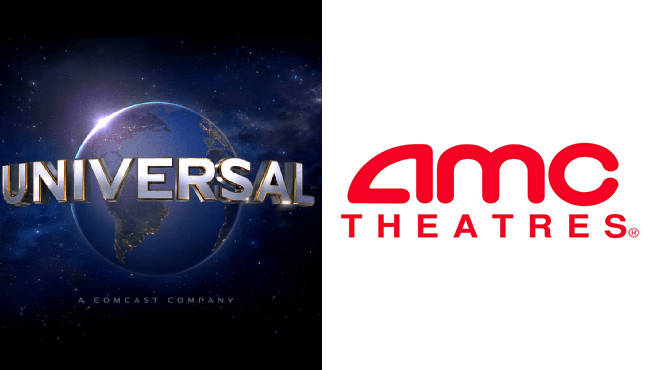Movies & TV / Columns
Universal vs AMC: Who Will Blink First?

This might come as a shock to some of you but the pandemic we find ourselves in will have long reaching effects on just about everything. Especially the entertainment industry.
AMC Theaters made the announcement that it’s banning all movies by Universal Pictures from playing at their locations. Here’s why. With movie theaters closed during the coronavirus pandemic, Universal went ahead and released Trolls World Tour on premium video on demand.
Turns out it was a massive success and NBC Universal chief Jeff Shell suggested they might do it again, even when theaters are back open, telling The Wall Street Journal, “As soon as theaters reopen, we expect to release movies on both formats.”
Not surprisingly, this didn’t sit well with certain movie chains. Like AMC. AMC, like all the other theaters, require movies they show to be exclusive to them and not appear for viewing at home for about three months. Sounds fair enough.
After Universal’s Troll, AMC CEO Adam Aron announced the chain would boycott all Universal movies, which is a pretty major movie to make.
Regal Cinemas said that it “is not boycotting Universal nor any other studio” at the time and will continue to play movies that “respect the theatrical window,” indicating it would show Universal films as long as they don’t debut on video on demand services prior to the end of this typical 90-day window.
A thin line to walk.
Regal owner Cineworld did call out Universal saying the studio’s actions were”completely inappropriate.” In an investor’s call, Shell said he doesn’t see premium video on demand as a “replacement” for movie theaters, but added, “it’s gonna be a complementary element and we’re just gonna have to see how long that takes and where that takes us.”
All of this is a strange mix of points. Boiling it down, Hollywood makes movies that they send to movie theaters, who pay a fee to show them to the audiences they were created for. Movie theaters operate on an incredibly thin profit line, relying on concession sales in order to stay in business. Yes, studios have other options now to get their product to audiences, but movie theaters are still the standard that a movies success is measure by.
I’ve never understood why studios treat the theaters like an afterthought. You’d think they’d make sure they thrive, help enhance the experience, and so on but the dollar really does drive the bottomline.
So now we have a standoff between AMC and Universal. And any other studio or theater that wants to take a chance. Looking at it realistically, AMC doesn’t have the leverage it once had and with entertainment viewing options being as available as they’ve ever been, movie theaters aren’t the only game in town anymore.
Facts are this: the movie business has been gravely impacted by the outbreak. Theaters shut down, studios postponing release dates, and pushing back shooting schedules.
Trolls is an interesting test because it comes at a time where you have lots of kids at home and the release of a popular franchise movie. Shell told WSJ, “The results for Trolls World Tour have exceeded our expectations and demonstrated the viability of PVOD [premium video on demand].” Doing the numbers, at $19.99 for two days’ worth of access, Trolls has grossed around $100 million.
Money talks. AMC’s CEO, Adam Aron, expressed his feelings in the press release but his point is clear, “This policy affects any and all Universal movies per se, goes into effect today and as our theatres reopen, and is not some hollow or ill-considered threat. Incidentally, this policy is not aimed solely at Universal out of pique or to be punitive in any way, it also extends to any movie maker who unilaterally abandons current windowing practices absent good faith negotiations between us, so that they as distributor and we as exhibitor both benefit and neither are hurt from such changes.”
Here lies the rub. While 2019’s domestic box office receipts of $11.3 billion were down slightly from 2018’s tally of $11.9 billion, according to data from Box Office Mojo, we have to remember that 2018 was a record-breaking year.
What’s coming out from the data is growth is coming from movie theaters having more seats and charging higher ticket prices. Both things that have a hard ceiling. If you look at the average total ticket sales figure per movie, per venue, that has been trending down for years. So is the total number of tickets being sold.
A site called The Numbers tracks movie industry data and they reported that last year’s total of 1.24 billion individual movie tickets sold in the United States was the second lowest number in years, extending a broad downtrend that first took shape in 2001.
I know we’re getting off track but it’s important to point this out so you can see how movie theaters are on the losing end of this battle.
Especially when you consider that Universal, in the last four years, has put out more movies than any other major studio.
At the end of the day, we’re going to be in a holding pattern for awhile and when things settle down, we’ll be looking at a different entertainment industry, no matter how you shake it. While AMC’s complaints are valid, they’re on the losing end of the deal and in order to survive, will have to accept it’s new position in the grand scheme of things.
But that’s just me. What do you think?







